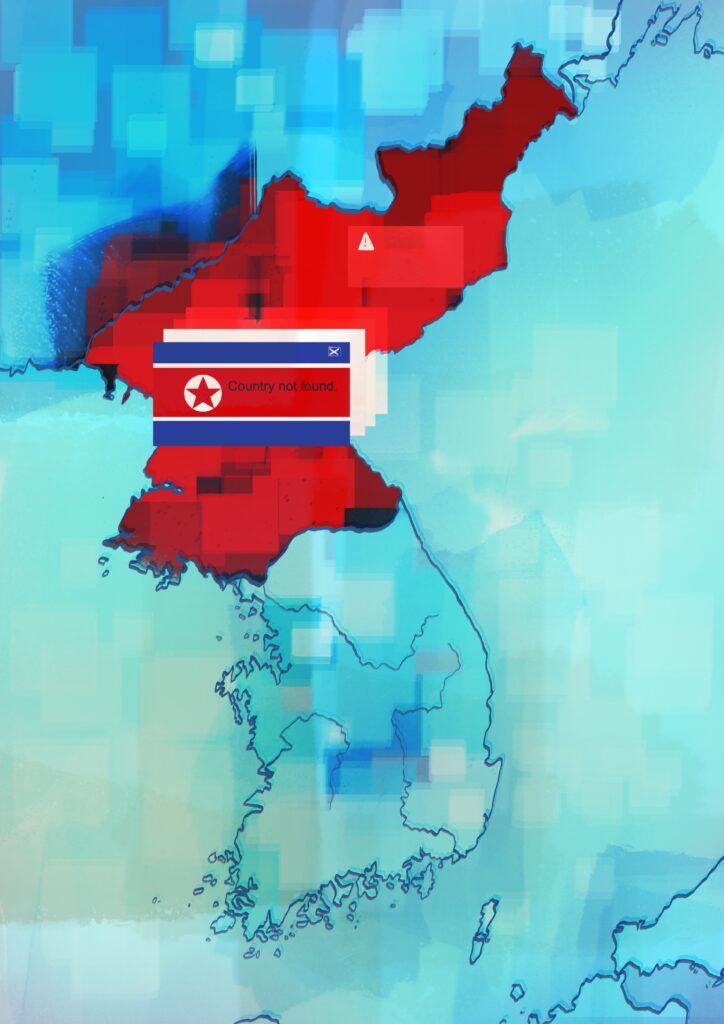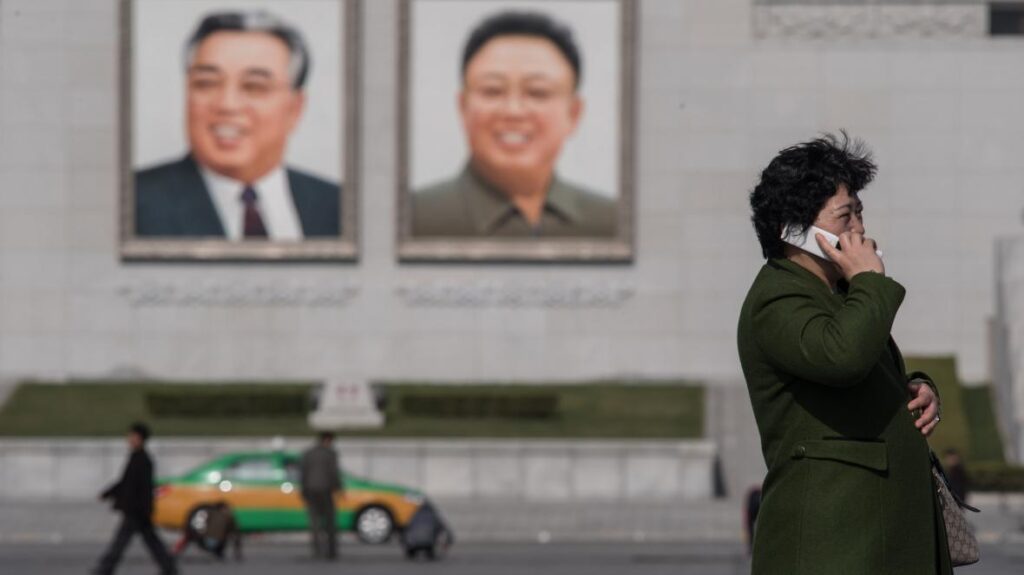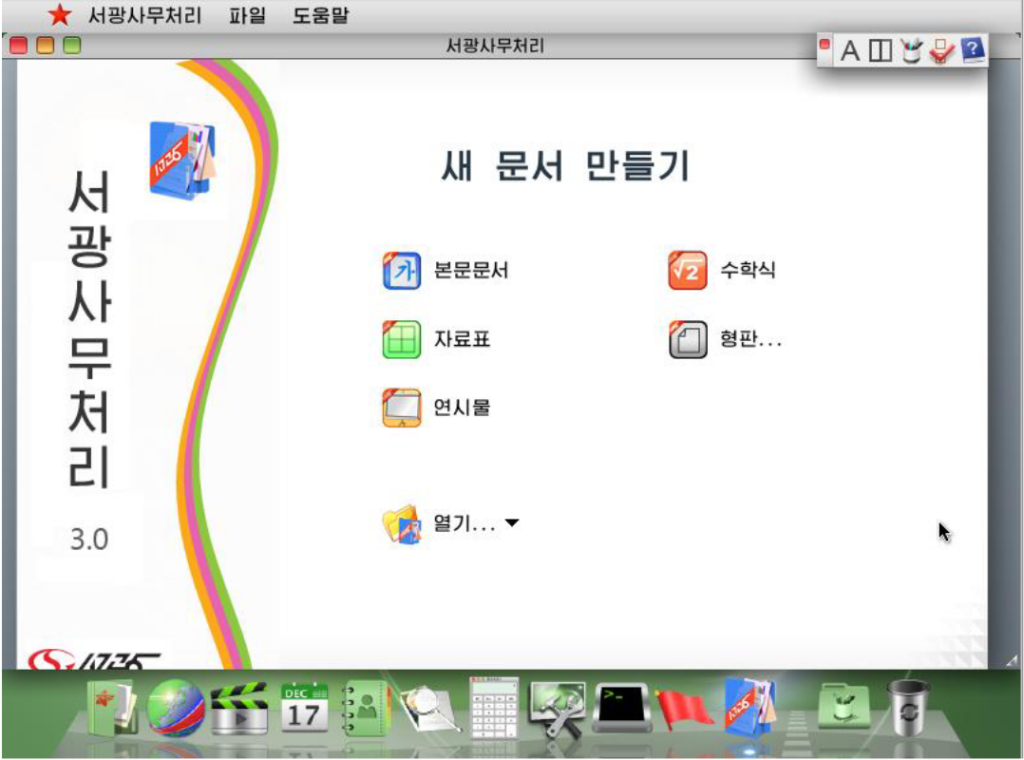Digital Life & Digital Rights
The recognition of digital rights as a key part of human rights in the 21st century is a major barrier towards fully protecting vulnerable people who lack access to basic human rights such as the right to information, privacy, and expression. Within North Korea, access to digital technology is severely restricted, and access to the global internet is almost entirely non-existent.
“[In North Korea] people’s main goal is to stay alive. It’s probably Kim Jong-Un’s goal too, and in order for him to survive, controlling all of this just seems like the obvious thing to do. Developing digital rights in North Korea will be impossible under Kim Jong-Un.” – Park Chang-Sik

In 2020, DataReportal ranked digital connection, and North Korea was ranked last with 0% of its population connected to the digital world. North Korea’s isolationist position has meant that all unapproved foreign content or technology is illegal, with only a small amount of censored information and news accessible to the general population. Though many citizens increasingly manage to get around government restrictions, the presence of digital rights in North Korea is seriously and deliberately limited. Such limitation ensures continued reliance on the North Korean state for goods, services, and most critically, information. Unfiltered global content and technology, through education and communication, develops political power and would create the opportunity for revolution against the Kim regime. It is for this reason that the government resists so strongly against allowing digital rights, instead using new developments in technology to increase their monitoring and surveillance capabilities.
Definition of digital human rights
Definition of digital media
Digital media refers to all digitized content that can be shared, created, or stored via the internet, computer networks, and every machine-readable format supported by software (Logan, 2016). Digital media contrasts with the aforementioned traditional media, while also serving as an evolution of traditional media. Thus, digital media can be considered as both a digital version of traditional media, such as ebooks, or entirely new formats, such as social media and instant messaging.
Why digital rights are important to democracy
“If the internet worked, it would be difficult to maintain North Korea. […] It would be a mess, for most people their thoughts will change. They will feel betrayed, it is just a matter of time, everyone will change. […] North Koreans who live abroad know the truth. […] The internet plays a major role in the defection of North Koreans. If they use it even once, they find out everything.” – Kim Yeon-Ri
Access, use and influence of digital media in North Korea

The digital landscape within North Korea has changed quickly in recent years. As the government deals with increasing financial and political pressures, it’s also trying to navigate the use of digital technology as a tool of surveillance and monitoring, whilst stopping the spread of technology – and therefore also information, connectivity, and foreign content – to North Korean citizens. As such, there have been changes in the development of digital technology within North Korea since the turn of the 21st century. The amount of exposure and access to the domestic intranet and the internet that North Koreans receive directly reflects the country’s rigidly enforced class divisions. Kretchun et al. (2017) divide internet access in North Korea into three categories: general population access, elite access, and hyper elite access. The general population, making up the vast majority of North Koreans, does not have free and simple access to the intranet or state-sanction technology and media which, largely as a result of lack of availability and finances that deliberately limit any exposure to digital devices and content. Elite social status gives certain groups within the population limited access to the intranet. All content on the intranet is screened before being displayed. This content is technically available to everyone in the country but is only used by a small number of citizens who have obtained access through an institution. These people are elite students, IT personnel, and people who do business with foreigners. Internet access is still heavily restricted and monitored. Lastly, hyper elite access gives full and unrestricted internet access to a very exclusive elite group, which has been described as “a dozen or more families” (Kretchun, Lee and Tuohy, 2017).
“I couldn’t use [the internet] at all. The people who can have access to the internet are very limited – even people who work in high ranked positions cannot use it. It’s only set to work in designated areas and for designated people. In 2016 or 2017, an MBC journalist wrote an article that claimed most rich families in North Korea had access to the internet. That’s ridiculous. They even said mid-level managers were allowed to use the internet, which is also ridiculous. Even foreigners – they can probably only use the internet for one hour a day. As long as this regime remains in North Korea, [using the internet] will be impossible.” – Park Chang-Sik
A 2019 survey of 200 North Koreans who had defected to South Korea between 2012 and 2018 reveals interesting data on the current use of digital technology within North Korea. One statistic that stood out is that of those interviewed, 46% owned their own phone. Of course, it is necessary to note two very important influences on this statistic. Firstly, those who are able and willing to defect are also those more likely to risk illegal acts such as owning a phone and have the means to do so. Further, the highest percentage of defectors lived along the North Korean-Chinese border, where it is easier to smuggle, and therefore use, mobile phones. As such, other surveys that are more representative of the North Korean population as a whole, such as the Korean Development Bank, report a number closer to 18% of North Koreans owning a mobile phone. However, even if this number is reduced for the general population remaining in North Korea, this data still suggests that a significant proportion of North Korea’s population owns a phone – especially when considering the difficulty in acquiring and using one unnoticed. In addition, over 20% of respondents who did not own their own phone were nevertheless able to access one through renting or paying for one-off use. This indicates that there is a substantial network accessible to much of the North Korean population that directly subverts the oppressive Kim regime, indicating that there exists a culture in which phones have become normalised despite the harsh and extreme efforts of the government. In a country where thought control is instilled since childhood and citizens are raised to not trust one another, only their Dear Leader, the mere existence of phones and their shared use points to a society that is determined to utilise technology and take control of as many aspects of their lives as possible.

Right to Privacy and Governmental abuse of digital rights
The western world often thinks of digital rights as something everybody should have access to. In terms of media and culture, it is assumed that there is access to different information and entertainment outlets such as the news, social media, film, and television. It is necessary to remind ourselves, however, that an important aspect of digital human rights is also the right to privacy. For North Koreans, the right to privacy does not exist, especially in regard to their digital rights.
For the last few years, North Korean hackers have been considered a serious threat by the international community. North Korea has launched cyber-attacks on governments, private businesses, and NGOs in order to gather data and embezzle large sums of money. However, North Korea also uses this IT knowledge in order to spy on their own citizens.
It is of the utmost importance for the government to control and restrain the access to foreign culture and news as much as possible, which is an infringement on digital rights. One of the most important pillars of the North Korean system is the blind faith and confidence the people have in their Supreme Leader Kim Jong-Un. Despite living in very harsh conditions, the general population is still loyal to its leader because of the heavy propaganda put in place by the government in order to brainwash the North Korean citizens. If more and more people have access to foreign culture and are able to see through the lies that are being fed to them by the government, then the whole system could be at risk.
“Kim Jong-Un probably knows well the dangers of digital technology. He probably knows that if he doesn’t regulate things properly, people would discover the truth. His father, Kim Jong-Il, probably didn’t know about it as there was only analog technology in his time. The use of digital technology in North Korea is not going to get better in the future.” – Park Chang-Sik
This is why the government is going to great lengths to restrain access to foreign content. This includes creating operating software for North Korean technologies to gather data on each device’s owner. For example, Red Star OS is an operating system illegally based on Mac OS created in North Korea that is installed on many devices such as laptops or tablets, which are legal, since they were created in North Korea. This forces North Koreans to choose between the risk of owning an illegal foreign device, or the lack of privacy on a legal North Korean device. Through this system, the government can have access to the data of every device connected through Red Star OS. Many North Koreans watch foreign content via USBs and SD cards. If they are using a Red Star device, the government will immediately know and will be able to react accordingly. However, they wouldn’t be the only ones in danger. With Red Star OS the government is also able to track every device each USB and SD card was previously plugged into.

Change under Kim Jong-Un
It has always been illegal for North Koreans to watch foreign media, but it was not always as reprehensible as it is today. Under Kim Jong-Un, there are reports of people even being executed for owning or accessing foreign media. According to a recent study by Uni Media, 71.5% of North Korean defectors think that it has become more dangerous to access foreign media since Kim Jong-Un rose to power. During his father Kim Jong-Il’s reign, although foreign content was clearly forbidden, the punishment was not as harsh.
“In 2009, when Kim Jong-Un was still the next of kin – the ‘young leader’ was his nickname – he talked about outside information in a speech he delivered. He talked about ‘viewing and sharing media not authorized by the government’. People started thinking that when Kim Jong-Un became the successor, accessing information from the outside world would become a greater sin. Sure enough, he killed people for watching dramas. Since he became the successor, people knew how serious it was.” – Park Chang-Sik
Under Kim Jong-Un, there have also been many more raids in public spaces such as schools and offices, as well as in people’s homes. Raids are done to find illegal devices such as USBs, SD cards, DVDs with illegal foreign content. The government attempts to encourage citizens to delete any illegal content, and if you are found with it and cannot give a bribe, there is likely severe punishment.
“I watched something on a CD and thought it was fun, so I recommended it to my friend. My friend was watching it at his/her house when they suddenly got inspected. They asked who the CD belonged to, and that’s how we got caught, my friend’s family and mine as well.” – Kim Bo Ram

It is evident that digital life in North Korea is very restricted – however, it is far from nonexistent. Despite the government’s best efforts, a non-negligible part of the North Korean population still has access to phones and laptops as well as foreign media content. Foreign content has found its way into North Korean culture and had an influence on its people. However, the punishment incurred by the North Korean population is extremely harsh for the simple act of listening to a foreign song, such as imprisonment or death. These sentences, as well as the lack of access to information and the constant breaching of privacy, can clearly be categorized as human rights abuse. The reason why Kim Jong-Un is relentless in his efforts to stop the spread of foreign culture and try to limit his citizens’ digital life is quite simple. He understands how dangerous digital rights can be to his regime.
This is why PSCORE is urging the international community, activists and concerned readers to spread awareness on the important issue of digital rights in North Korea in relations to human rights abuse. The restrictions imposed on North Koreans’ digital rights are a key component of why North Korea is still so closed off today and digital access might just be the key for North Korea to finally open up to the world.
Donate Now
Other types of Donations
Monthly Donation
Join our monthly donation program to give regularly. You can change it anytime.
Donate for Education
Help better equip students to go to university or pursue various careers.
You can see how we use your donations on our Donations & Expenditures page.
